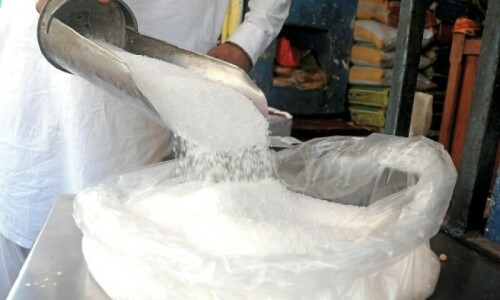Come rain or shine, the stock market never gives the call for a shutdown.
Unaccustomed to a heavy downpour, city life became paralysed when rain lashed Karachi in the last week of July. Authorities shut down schools and colleges. Traders remained indoors as retail and wholesale markets kept their shutters down.
But the gong at the Pakistan Stock Exchange (PSX) sounded at exactly the usual time to declare the start of trading. Never mind the thin participation reflected in the volume and value of traded shares, the market closed at its regular time.
But this was not the case until the late 1980s. The then Karachi Stock Exchange was a sleepy place with a few score listed companies and market capitalisation in billions of rupeesuntil the first government of Benazir Bhutto threw open the doors to foreign investors.
Rain is only a minor event for the capital market where the game of high finance turns paupers into billionaires and vice versa — all through the day, every day
A veteran who has frequented the stock market for decades in search of a fortune that keeps eluding him to this day recalls that until 1986, traders shouting at the top of their voice lao and lay — “I am buying” and “I am selling,” respectively — would suddenly go silent and trading would cease for the day. The reason would sometimes be as unremarkable as the death of an aged, bed-ridden stockbroker who had retired many years ago. Perhaps no one until then had ever heard of Lord Tennyson’s immortal words: “For men may come and men may go, but I go on for ever.”
The stock exchange at the time enjoyed the highest number of holidays in a year. Brokers and traders decided not to venture out to the market and instead stayed in bunkers during the 1965 and 1971 wars. A few active brokers who were regulators, managers, biggest stakeholders and traders rolled into one could make the decision for the market in a single meeting.
But all that changed with the entry of foreign investors and foreign funds around 1992 when the local market had to integrate with regional markets. Given to trading every single day except on scheduled holidays, a stockbroker was most likely to lose a foreign client if he sat back home enjoying the rainy weather.
Trading at the PSX is still sometimes suspended owing to “technical glitches,” but that is involuntary and lasts only a few hours. Market watchers assert that even the biggest markets, such as the one on Wall Street, sometimes face similar problems. If the regulators and stockbrokers at the PSX, which expanded by leaps and bounds in recent decades, still thought they could shut down the market at will, they had to pay a heavy price.
It happened during the market crash in 2008 that swept away over a trillion rupees and no participant, including stockbrokers, could escape the damage.
Following a collapse in stock prices that plunged the KSE-100 index by almost 55 per cent in four months, the regulators placed a floor at 9,144 points on Aug 28, 2008, to prevent a further fall. It turned the catastrophe into calamity.
The floor remained in place for as many as 108 days. All investors, including foreigners who wanted to seek an exit, were trapped. Such a blockage was unheard-of in the history of stock exchanges.
During World War II, the London Stock Exchange closed for only a week while the New York Stock Exchange remained open for trading throughout the six-year period.
The Pakistan market is still suffering the consequences of that decision. Foreign investors avoided the local bourse for a long time and MSCI relegated it from the emerging to frontier market status. The market regained the emerging status in May 2017.
No action was taken after a detailed report on the stock market crash of 2008 — prepared by Securities and Exchange Commission of Pakistan (SECP) former chairman Shamim Ahmed Khan — was released. The report was quietly shelved.
“However, it taught the market regulators that the closure of the market in any eventuality is never an option,” said a retired broker.
There was some discussion about whether the market should be shut down in March 2019 when the country was on the brink of war India.
The regulators did not utter a word. Most market gurus thought there would be no halt in trading.
Rain then is only a minor event for the capital market where the game of high finance turns paupers into billionaires and vice versa — all through the day, every day.
Published in Dawn, The Business and Finance Weekly, August 5th, 2019
















































